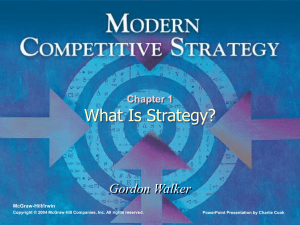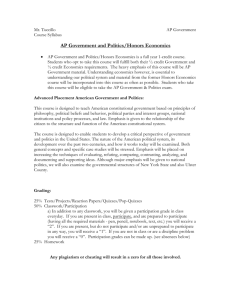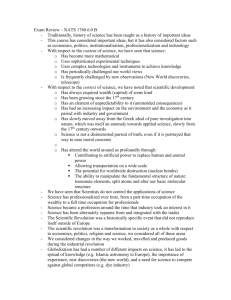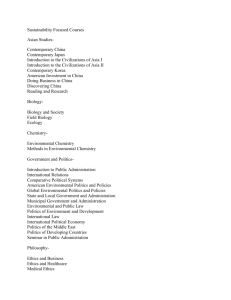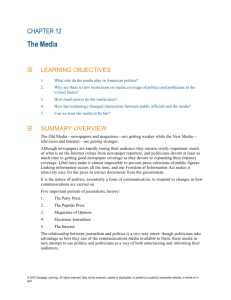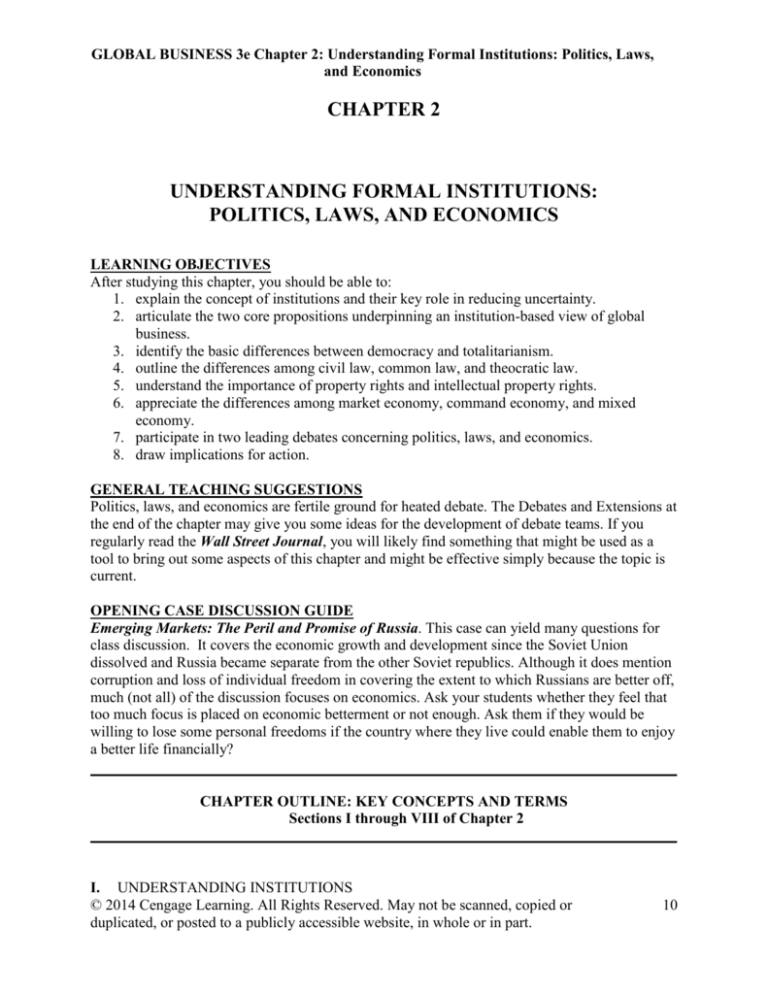
GLOBAL BUSINESS 3e Chapter 2: Understanding Formal Institutions: Politics, Laws,
and Economics
CHAPTER 2
UNDERSTANDING FORMAL INSTITUTIONS:
POLITICS, LAWS, AND ECONOMICS
LEARNING OBJECTIVES
After studying this chapter, you should be able to:
1. explain the concept of institutions and their key role in reducing uncertainty.
2. articulate the two core propositions underpinning an institution-based view of global
business.
3. identify the basic differences between democracy and totalitarianism.
4. outline the differences among civil law, common law, and theocratic law.
5. understand the importance of property rights and intellectual property rights.
6. appreciate the differences among market economy, command economy, and mixed
economy.
7. participate in two leading debates concerning politics, laws, and economics.
8. draw implications for action.
GENERAL TEACHING SUGGESTIONS
Politics, laws, and economics are fertile ground for heated debate. The Debates and Extensions at
the end of the chapter may give you some ideas for the development of debate teams. If you
regularly read the Wall Street Journal, you will likely find something that might be used as a
tool to bring out some aspects of this chapter and might be effective simply because the topic is
current.
OPENING CASE DISCUSSION GUIDE
Emerging Markets: The Peril and Promise of Russia. This case can yield many questions for
class discussion. It covers the economic growth and development since the Soviet Union
dissolved and Russia became separate from the other Soviet republics. Although it does mention
corruption and loss of individual freedom in covering the extent to which Russians are better off,
much (not all) of the discussion focuses on economics. Ask your students whether they feel that
too much focus is placed on economic betterment or not enough. Ask them if they would be
willing to lose some personal freedoms if the country where they live could enable them to enjoy
a better life financially?
CHAPTER OUTLINE: KEY CONCEPTS AND TERMS
Sections I through VIII of Chapter 2
I. UNDERSTANDING INSTITUTIONS
© 2014 Cengage Learning. All Rights Reserved. May not be scanned, copied or
duplicated, or posted to a publicly accessible website, in whole or in part.
10
GLOBAL BUSINESS 3e Chapter 2: Understanding Formal Institutions: Politics, Laws,
and Economics
1. Key Concept
Institutions are commonly defined as “the rules of the game.” Institutions have formal
and informal components, each with different supportive pillars.
2. Key Terms
Cognitive pillar refers to the internalized, taken-for-granted values and beliefs that
guide individual and firm behavior.
Formal institutions include laws, regulations, and rules.
Informal institutions include norms, cultures, and ethics.
Institutional framework is made up of formal and informal institutions governing
individual and firm behavior.
Institution-based view requires firms to constantly monitor, decode, and adapt to
the changing rules of the game to survive and prosper.
Institutions are popularly known as “the rules of the game.”
Institutional transitions are fundamental and comprehensive changes introduced to
the formal and informal rules that affect firms as players.
Normative pillar refers to how the values, beliefs, and actions of other relevant
players—collectively known as norms —influence the behavior of local individuals
and firms.
Regulatory pillar is the coercive power of governments.
II. WHAT DO INSTITUTIONS DO?
1. Key Concept
The key functions of institutions are to reduce uncertainty, curtail transaction costs, and
combat opportunism.
2. Key Terms
Institutional transitions: defined as “fundamental and comprehensive changes
introduced to the formal and informal rules of the game that affect organizations as
players.”
Opportunism: defined as self-interest seeking.
Transaction costs: defined as costs associated with economic transactions—or more
broadly, costs of doing business.
III. AN INSTITUTION-BASED VIEW OF GLOBAL BUSINESS
1. Key Concepts
Proposition 1: Managers and firms rationally pursue their interests and make choices
within formal and informal institutional constraints in a given institutional framework.
Proposition 2: When formal constraints are unclear or fail, informal constraints will play
a larger role.
IV. POLITICAL SYSTEMS
1. Key Concepts
Democracy is a political system in which citizens elect representatives to govern the
country. Totalitarianism is a political system in which one person or party exercises
absolute political control.
© 2014 Cengage Learning. All Rights Reserved. May not be scanned, copied or
duplicated, or posted to a publicly accessible website, in whole or in part.
11
GLOBAL BUSINESS 3e Chapter 2: Understanding Formal Institutions: Politics, Laws,
and Economics
2. Key Terms
Communist totalitarianism centers on a communist party.
Democracy is a political system in which citizens elect representatives to govern the
country on their behalf.
Political risk—risk associated with political changes that may negatively impact
domestic and foreign firms.
Political system refers to the rules of the game on how a country is governed
politically.
Right-wing totalitarianism is characterized by its intense hatred of communism.
Theocratic totalitarianism refers to the monopolization of political power in the
hands of one religious party or group.
Totalitarianism (dictatorship) is defined as a political system in which one person
or party exercises absolute political control over the population.
Tribal totalitarianism refers to one tribe or ethnic group (which may or may not be
the majority of the population) monopolizing political power and oppressing other
tribes or ethnic groups.
Political Risk involves risk associated with political changes that may negatively
impact domestic and foreign firms.
V. LEGAL SYSTEMS
1. Key Concept
Civil law uses comprehensive statutes and codes as a primary means to form legal
judgments. Common law is shaped by precedents and traditions from previous judicial
decisions.
2. Key Terms
Civil law uses comprehensive statutes and codes as a primary means to form legal
judgments.
Common law is shaped by precedents and traditions from previous judicial
decisions.
Copyrights are the exclusive legal rights of authors and publishers to publish and
disseminate their work.
Intellectual property specifically refers to intangible property that results from
intellectual activity (such as books, videos, and websites).
Intellectual property rights (IPRs) are rights associated with the ownership of
intellectual property. IPRs primarily include rights associated with (1) patents, (2)
copyrights, and (3) trademarks.
Legal system refers to the rules of the game on how a country’s laws are enacted and
enforced.
Patents are legal rights awarded by government authorities to inventors of new
products or processes, who are given exclusive rights to derive income from such
inventions through activities such as manufacturing, licensing, or selling.
Piracy: The unauthorized use of IPRs is widespread, ranging from unauthorized
sharing of music files to deliberate counterfeiting of branded products.
Property rights: The legal rights to use an economic property (resource) and to
derive income and benefits from it.
© 2014 Cengage Learning. All Rights Reserved. May not be scanned, copied or
12
duplicated, or posted to a publicly accessible website, in whole or in part.
GLOBAL BUSINESS 3e Chapter 2: Understanding Formal Institutions: Politics, Laws,
and Economics
Theocratic law: A legal system based on religious teachings.
Trademarks are the exclusive legal rights of firms to use specific names, brands,
and designs to differentiate their products from others.
VI. ECONOMIC SYSTEMS
1. Key Concept
A pure market economy is characterized by laissez faire and total control by market
forces. A pure command economy is defined by government ownership and control of
all means of production. Most countries operate mixed economies with a different
emphasis on market versus command forces.
2. Key Terms
Command economy: Under this system, all factors of production should be
government or state-owned and controlled, and all supply, demand, and pricing are
planned by the government.
Economic system refers to the rules of the game on how a country is governed
economically.
Market economy is a term referring to a system characterized by the “invisible
hand” of market forces: government takes a hands-off approach known as the laissez
faire.
Mixed economy, by definition, is an economic system that has elements of both a
market economy and a command economy.
State-owned enterprises (SOEs)—firms that are at least 10% owned by the state. A
Sovereign wealth fund (SWF) is a state owned investment fund.
VII. DEBATES AND EXTENSIONS
1. Key Concept
Three leading debates: (1) What drives economic development? (2) What are the most
effective and least disruptive institutional transitions toward more market competition?
(3) How to best measure political risk?
2. Key Terms
Market transition debate pertains to how to make the transitions work in a most
effective and least disruptive way.
Moral hazard refers to recklessness when people and organizations (including firms
and governments) do not have to face the full consequences of their actions.
Path dependency: the present choices of countries (as well as firms and individuals)
are constrained by the choices made previously.
Washington Consensus is a view centered on the unquestioned belief in the
superiority of private ownership over state ownership in economic policymaking that
is often spearheaded by two Washington-based international organizations: the
International Monetary Fund and the World Bank.
VIII. MANAGEMENT SAVVY
1. Key Concept
Managers considering working abroad should have a thorough understanding of the
formal institutions before entering a country. In situations where formal constraints are
© 2014 Cengage Learning. All Rights Reserved. May not be scanned, copied or
duplicated, or posted to a publicly accessible website, in whole or in part.
13
GLOBAL BUSINESS 3e Chapter 2: Understanding Formal Institutions: Politics, Laws,
and Economics
unclear, managers can reduce uncertainty by relying on informal constraints, such as
relationship norms.
END-OF-CHAPTER GUIDE
*Review Questions and Answers
*Critical Discussion Questions and Answers
*Global Action
*Video Case
*Closing Case
REVIEW QUESTIONS AND ANSWERS
1. ON CULTURE: Is there any relationship between the culture of a given country and the
extent to which it will likely have a dynamic, growing economy? Are there cultures that
would be more likely to limit economic growth and even result in poverty? Defend your
answer.
Usually there are multiple forces that impact on a given economy during a given period
of time. It could be argued that if one culture values competitive hard work and change
but another country’s culture looks down upon such things that such values could impact
on the economy to at least some degree. Some will disagree and may point out that even
if it does, that economic impact is not the only issue in life.
2. Compare PengAtlas Maps 1.1 (Developed Economies and Emerging Economies) and
Map 1.2 (Political Freedom Around the World). To what extent do developed economies
tend to have a high level of political freedom–or is there any relationship? If there is a
relationship, is it causal or coincidental? Explain.
Map 1.1 lists 33 developed nations Map 1.2 lists countries as Free, Partly Free or Not
Free. Of the 33 developed nations, 32 are on the Free list and the remaining nation
(Singapore) is the on the Partly Free list. Most students will find it difficult to believe that
there in no relationship between being free and being developed. However, China is
listed as Not Free but is likely to eventually be listed as developed – whether it will also
eventually be on the Free or Partly Free list remains to be seen.
3. Compare PengAtlas Map 1.3 (Legal Systems Around the World) and Map 1.1. In your
opinion, what stands out to you regarding each category of legal system? Are there any
relationships? If so, are they causal or coincidental? Defend your answer.
Of the 20 countries with civil law, a majority (12 or 80%) are developed. Of the 16
countries that have common law, a majority (9 or 56%) are developed. The three
countries with theocratic law are not listed as developed. Since there were far fewer
theocratic law countries as compared to the other two categories, it cannot be stated with
certainty that there is or is not a relationship between development and theocratic law.
© 2014 Cengage Learning. All Rights Reserved. May not be scanned, copied or
duplicated, or posted to a publicly accessible website, in whole or in part.
14
GLOBAL BUSINESS 3e Chapter 2: Understanding Formal Institutions: Politics, Laws,
and Economics
Furthermore, the numbers 20 and 16 are not large numbers. However, it does appear
that a larger listing of countries might indicate a relationship.
© 2014 Cengage Learning. All Rights Reserved. May not be scanned, copied or
duplicated, or posted to a publicly accessible website, in whole or in part.
15
GLOBAL BUSINESS 3e Chapter 2: Understanding Formal Institutions: Politics, Laws,
and Economics
4. How can the rules of the game reduce uncertainty?
The very word “rules” suggests the answer to that question. When there is nothing
involving formal or informal rules to serve as a guideline, there is obviously going to be
uncertainty.
5. Do rules of the game promote or prevent opportunism? Defend your answer.
Students will probably argue that much depends on the rules.
6. Do you agree that managers and firms really pursue their interests? Why or why not?
It probably could be argued that they pursue their interests but their idea of what
constitutes their interest may not be in agreement with what others would regard as their
interest. A firm or person may wish to be respected and admired by society – that may be
what the firm or individual feels is in one’s best interest. However, that might involve not
taking advantage of an opportunity for increased profits or a raise in compensation.
7. What are examples of informal constraints that affect global business firms?
Students should be able to list a variety of constraints such as the negative reactions of
various stakeholders to actions that may be legal but viewed as unacceptable.
8. What are the pros and cons of expanding into a democratic country?
Various responses may include less threat from an arbitrary dictator but there is the risk
that if the democracy does not have any constraints on what the majority can do, a
minority could be exploited by the majority – i.e. four foxes and one chicken voting on
what to have for supper.
9. What are the pros and cons of expanding into a totalitarian country?
At first such a country might seem to offer stability. However, the pros or cons of such an
expansion could be affected by the extent that there is opposition to the government in
that nation and whether that could lead to an overthrow of the government but also
confiscation of your property? Another is to what extent are there groups who might
boycott your products if you do business in that country?
10. Would you rather do business in a country that uses civil law or common law? Why?
Opinions may vary depending on the extent to which one prefers flexibility versus
certainty. Some may prefer what is being used in the country in which they live.
11. What are some of the issues to consider before doing business in a theocracy?
Cultural sensitivity would be especially important in such a country. Familiarization
with beliefs and the application of those beliefs to all aspects of business would be
essential.
12. What is the relationship between property rights and economic development?
According to de Soto, there is a significant relationship between the two: The legal
protection of property rights allows for economic growth. For example, when property
rights are in place, an entrepreneur can use his or her title to a piece of land as
collateral for a small business loan.
© 2014 Cengage Learning. All Rights Reserved. May not be scanned, copied or
15
duplicated, or posted to a publicly accessible website, in whole or in part.
GLOBAL BUSINESS 3e Chapter 2: Understanding Formal Institutions: Politics, Laws,
and Economics
13. Why is it important to protect IP rights?
IP is normally intangible and can thus be easily duplicated. The incentive to invent or
create music, etc. could be reduced if innovators had no assurance of reaping rewards
from their efforts.
14. Under what circumstances would it be easier to do business in a command economy than
a market economy?
In a market economy, one may need to convince many buyers but in a command economy
in which the government is the buyer, the persuasion needs to be directed only toward
those in control of the government. Also, buyers in a market economy may be fickle and
change their mind over time but in a command economy, there is stability unless those in
the government change what they want.
15. Many view the United States as a mixed economy. In your opinion, is the mix changing?
If so, how? Is it shifting more to a command economy or a market economy? Defend
your answer.
The U.S. economy is constantly changing but in which direction may depend on the
political and economic tilt of those answering the question. Those who want more
government involvement may not feel that a specific increase in government is sufficient
and may take a much different view of the direction of the economy than those who feel
that the country is moving toward a command economy.
16. In your opinion, which is most important to economic development—culture, geography,
or institutions? Defend your answer.
This is a question in which the answer is not so important as the reasoning given and the
ability to defend that reasoning.
17. Given whatever plans you have for the future, do you feel you would have the greatest
likelihood of success under private ownership or state ownership? Why?
The answer to this question may depend on the specific individuals career plans (perhaps
it involves some type of government activity, for example) and the person’s social,
political and economic tilt.
18. Why is it important to understand formal institutions before entering a country? Explain
by using an example.
This is true for both firms and individuals who wish to avoid being fined or imprisoned.
Students should be able to create examples using their own country that could get a
person or firm into trouble if there was no awareness of formal institutional
requirements.
19. ON CULTURE: Why is understanding of human relations within a culture sometimes
more important than legal expertise?
In some societies there will be no need for legal expertise (for example, to prepare a
contract) until the relationship has been established so that one is trusted.
CRITICAL DISCUSSION QUESTIONS AND ANSWERS
© 2014 Cengage Learning. All Rights Reserved. May not be scanned, copied or
duplicated, or posted to a publicly accessible website, in whole or in part.
16
GLOBAL BUSINESS 3e Chapter 2: Understanding Formal Institutions: Politics, Laws,
and Economics
1. How do you explain your country’s economic success (or failure)?
Encourage students to answer this question by focusing on concepts brought forth in this
chapter (political systems, laws, economic systems) and avoid using the question to
expound favor or opposition to a politician or ideology. However, this is a question in
which the answer is not as important as the thought process and the ability to clearly
articulate.
2. What is your view on the debate between private ownership and state ownership?
The response will likely be the result of ideology but this is a question in which the
answer is not as important as the thought process and the ability to clearly articulate.
3. ON ETHICS: As manager, you discover that your firm’s products are counterfeited by
small family firms that employ child labor in rural Bangladesh. You are aware of the
corporate plan to phase out these products soon. You also realize that once you report the
counterfeiting to the authorities, these firms will be shut down, employees will be out of
work, and families and children will be starving. How would you proceed?
This is a question in which the answer is not as important as the thought process and the
ability to clearly articulate. However, since you plan to phase out the product you may
chose to ignore the counterfeiting. Even though child labor is involved, since child
starvation is worse, you might offer advice to the family firms as to how to be more
successful.
4. ON ETHICS: Your multinational is the largest foreign investor and enjoys good profits
in Sudan, where government forces are reportedly cracking down on rebels and killing
civilians, and Vietnam, where religious leaders are reportedly being prosecuted. As
country manager, you understand that your firm is pressured by activists to exit these
countries. The alleged government actions, which you personally find distasteful, are not
directly related to your operations. How would you proceed?
Although this is also a question in which the answer is not as important as the thought
process and the ability to clearly articulate, there are some things that should be
considered even by students who really do not care about social/humanitarian issues and
are only concerned about the bottom line. In a global economy with instant global
communication of news, the policies of a given country might not affect a firm’s
operations in that country but it might affect the firm’s sales and problems with
legislative initiatives in other countries.
GLOBAL ACTION
1. Evaluating political risk is an important element of country risk analysis. In fact, your
personal interest relates to countries in the Middle East and North Africa region that have
a high political risk. Provide a brief overview of the region and the reasoning behind
assessing these countries that have been assessed with high political risk. From this list,
which country has the highest overall country risk?
Exercise 1 Answers
One resource which can be used is “A.M. Best Country Risk Ratings”. This website can
be found by entering the search term “country risk analysis” at the globalEDGE™
© 2014 Cengage Learning. All Rights Reserved. May not be scanned, copied or
17
duplicated, or posted to a publicly accessible website, in whole or in part.
GLOBAL BUSINESS 3e Chapter 2: Understanding Formal Institutions: Politics, Laws,
and Economics
Resource Desk search box located at http://globaledge.msu.edu/resourceDesk/. Once at
the A.M. Best Country Risk Ratings website, click on the “AMB Country Risk Report:
Global Summary” link (located in the middle). Answers may vary based on the specific
report used (the September 2009 report was used for the purposes of this exercise). After
reading through the available report, the 5 countries in the Middle East and North Africa
which are indicated as high political risk are: Egypt, Jordan, Morocco, Turkey, and
Lebanon. To assess which country has the highest overall country risk, each of these 5
countries can be related back to the Country Risk Tier (CRT) list. As such, only Lebanon
is listed in the lowest category (CRT-5). Therefore, as of September 2009, Lebanon could
be considered to have the highest overall country risk.
Search Term: “country risk analysis”
Resource Name: A.M. Best Country Risk Ratings
Website: http://www3.ambest.com/ratings/cr/crisk.aspx
globalEDGE™ Tag: Country Level
2. Since you work for a diversified multinational corporation, economic risk across different
sectors of the world economy is an integral part of analysis as it indicates the future
business prospects for specific industries. Evaluate the risk assessment of three industry
sectors that are available to analyze. Prepare a report and provide a recommendation
concerning which industry and region would be most beneficial to your company.
Exercise 2 Answers
One resource which can be used is “@rating”. This website can be found by entering the
search term “different sectors” at the globalEDGE™ Resource Desk search box located
at http://globaledge.msu.edu/resourceDesk/. Once at the @rating website, use the
dropdown box for Sectorial Risk (located on the right side). Answers may vary based on
the specific industries chosen. However, if Chemicals, Mass Distribution, and
Pharmaceuticals are chosen, then the evaluation may follow a specific format. The
worldwide evaluation for each sector is: Chemicals (B+), Mass Distribution (B+), and
Pharmaceuticals (A-). In general, this appears positive. In addition, the highest ranking
regions (e.g., regions with low industry risk) for each region are as follows: Chemicals
(Middle East/North Africa and Japan), Mass Distribution (Middle East/North Africa,
CIS, Japan, Emerging Asia, and Latin America), and Pharmaceuticals (Emerging Asia,
North America, Western Europe, and Latin America). This may lead to a discussion
concerning the ideal regions for their company. For instance, according to the analysis of
the Chemicals, Mass Distribution, and Pharmaceuticals industries, it would appear that
the Middle East/North Africa, Japan, and Latin America may be the most beneficial for
the company.
Search Term: “different sectors”
Resource Name: @rating
Website: http://www.trading-safely.com/
globalEDGE™ Tag: Country Level
VIDEO CASE DISCUSSION GUIDE AND ANSWERS
© 2014 Cengage Learning. All Rights Reserved. May not be scanned, copied or
duplicated, or posted to a publicly accessible website, in whole or in part.
18
GLOBAL BUSINESS 3e Chapter 2: Understanding Formal Institutions: Politics, Laws,
and Economics
Title:
India and China Economic Giants
RT:
3:28
Topic Key: Institution-based view, Global business, Formal institutions, Political systems,
Democracy, Totalitarianism, Communist totalitarianism, Political risk, Property
rights, Intellectual property rights, Patents, Piracy, Economic system, Market
economy, State owned enterprises, State ownership, Private ownership
The video opens with a ride on the Shanghai airport train in China which at 430 km/h and 270
miles/h is the world’s fastest. The moment you arrive in China, the country shouts progress.
China is out to prove a point by overtaking the world. The video captures traffic beeping in India
where it, too, is on a path for growth and riches but it doesn’t’ look that way with some roads
being the worst in the world. Democracy has not delivered the transport infrastructure which
India so desperately needs. The narrator examines two individuals, one from China, Billy Wang,
and one from India, Tyron Toladi, for how it looks to them as they create the new wealth.
Billy Wang’s Shandbrai shoes tell the tale. His workers copy from photos of their customer’s
favorite shoes—all imitation not innovation. The business is expanding very fast like all Chinese
manufacturing. Mr. Wang, certainly, doesn’t question the Chinese system which helps make him
rich. Bill Wang says (through interpretation) according to the Chinese way of thinking, the
political system is decisive—everything else is second to this. With ships in the harbor, this way
of thinking is evident when you see the big picture in China too. Shanghai’s international port is
largely one way traffic. China doesn’t buy much overseas so many containers arrive empty but
they go out crammed full. China is selling hard. The world has good reason to worry. China’s
achievement is simply staggering. Single-minded, one party government, making clear decisions
means that China dominates the export world.
But in India, young risk takes are not dismayed. Tyron Toladi, 22 years old, is so confident that
he cut short studies in American to create business in Mumbai— high fashion accessories. He
insists that India can beat China by combining cheap labor with design skills—innovation not
imitation. Tyron says we never copy direct. We spend so much time consistently on how to make
new products, new designs, news things out there, finding new trends, and developing new
styles. In the big picture of India, skills drive heavy industry too. India steel companies can’t
compete with China’s bulk standard production so they make only high value specialist steel
meeting Europe’s most exacting standards. This source of heavy industry is where India sees
opportunity from massive growth over the next 10 to 15 years. The Indians are convinced they
have a huge edge over China.
For Billy Wang and Tyron Toladi, both countries are rising at a dizzying rate. But, it’s clear
India lags far behind for now. Democracy and the need for public consent hasn’t delivered
change so quickly. In China, where there is no need for consent, the risk of major political upset
seems much greater. The only certainty is that both countries will race each other to overtake
most of the outside world.
Also check out http://www.businessweek.com/magazine/content/05_34/b3948401.htm
Suggested Discussion Questions and Answers
© 2014 Cengage Learning. All Rights Reserved. May not be scanned, copied or
duplicated, or posted to a publicly accessible website, in whole or in part.
19
GLOBAL BUSINESS 3e Chapter 2: Understanding Formal Institutions: Politics, Laws,
and Economics
What impact do the political systems of each country have on their efforts toward
globalization?
o Text: A political system refers to the rules of the game on how a country is
governed politically. At the broadest level, there are two primary political
systems: (1) democracy and (2) totalitarianism. Democracy is a political system in
which citizens elect representatives to govern the country on their behalf. A
fundamental aspect of democracy that is relevant to the effective conduct of
global business is an individual’s right to freedom of expression and organization.
The opposite end of democracy is totalitarianism (also known as dictatorship),
which is defined as a political system in which one person or party exercises
absolute political control over the population. Totalitarianism, in general, is not as
good for business as democracy.
o China and Billy Wang: China and Billy Wang’s efforts toward globalization will
be determined by the totalitarian government. From the video, Mr. Wang,
certainly, doesn’t question the Chinese system which helps make him rich
because the political system is decisive. Billy Wang’s decisions to globalize or do
any business at all will be dictated by what the communist government says he
must do. With a dictatorship/communist government in place, political risk is
much greater which could upset efforts to globalize or do business internationally.
However, decisions are made faster with only one person in charge. As a result,
China shouts progress.
o India and Tyron Toladi: India and Tyron Toladi’s efforts toward globalization
will be determined by their democratic government. From the video, Mr. Toladi
has the opportunity to innovate and create new ideas within his business. Tyron
Toladi’s decisions to globalize or do any business is his choice. With the
democratic government in place, political risk is lower which invites more
globalization. However, decisions are made slower because of the need for public
consent which reduces the speed of change. As a result, infrastructure problems
hinder India’s progress toward globalization.
How do IP rights differ between India and China? What distinctive competencies in IP
exist for India and China?
o Text: Intellectual property rights (IPRs) are rights associated with the ownership
of intellectual property. IPRs primarily include rights associated with (1) patents,
(2) copyrights, and (3) trademarks.
o IPRs China: According to the video, China is more about imitation that
innovation. China is likely to have fewer IPRs because they tend to counterfeit
branded products. Their distinctive competency is to create fake DVDs and
Rolexes.
o IPRs India: According to the video, India is more about innovation than imitation.
India is likely to have more IPRs because they create new products. Although not
explicit, India’s distinctive competency could be to establish more patents on
fashion accessories.
Describe how India and China are market economies.
o Text: An economic system refers to the rules of the game on how a country is
© 2014 Cengage Learning. All Rights Reserved. May not be scanned, copied or
duplicated, or posted to a publicly accessible website, in whole or in part.
20
GLOBAL BUSINESS 3e Chapter 2: Understanding Formal Institutions: Politics, Laws,
and Economics
governed economically. A pure market economy is characterized by the “invisible
hand” of market forces first noted by Adam Smith in The Wealth of Nations in
1776. The government takes a hands-off approach known as the laissez faire.
Specifically, all factors of production should be privately owned. The government
should only perform functions that the private sector cannot perform (such as
providing roads and defense). A pure command economy is defined by a
government taking, in the words of Lenin, the “commanding height” in the
economy. All factors of production should be government-or state-owned, and all
supply, demand, and pricing are planned by the government. A mixed economy,
by definition, has elements of both market economy and command economy.
o China and India market economies: Whether a country is communist or
democracy, each one has government and private sector intervention. Therefore,
really, making them mixed economies. Communist and Democracy countries
claim to have a “market economy,” but the meaning is different depending of the
degree to which market forces are allowed to organize their economies.
Does India have an opportunity to overtake China? Why or why not?
o Text: Economic development in different countries is driven by culture,
geography, and institutions.
o India Overtake China: India does have the opportunity to overtake China. While
China has a culture of smart and hard working so does India. China may also have
country-specific resources but India does as well. In both accounts, India is
superseding China in true innovation. Using an institutional framework view,
India provides:
Opportunity to grow and specialize to capture gains from trade
A strong, formal, market supporting framework to trade on an informal
basis
Market supporting institutions to protect property rights
CLOSING CASE DISCUSSION GUIDE AND ANSWERS
Emerging Markets: The Future of Cuba covers the problem that the Castros have had with
economic ideology unable to overcome economic reality. It points to some benefits that have
been obtained since Fidel Castro established Communist control but also some of the loss of
economic capabilities that have occurred. It appears that Cuba may have to relax controls and
allow more economic and individual freedom. In addition to questions below, you may raise
the question as to why there should be any problem since there is very little power in the
hands of any who might oppose the Communist system and the government can use the
police and military to force everyone to do what the government wants?
1. Why has state ownership of farms resulted in a disaster in Cuban farming?
You can point out that there has been no problem that can be attributed to weather or a
change in soil. You can further extend the question by pointing out that agricultural
output was not a big problem before the Castros took over. Furthermore, with the state in
firm control, supposedly things should be better organized to achieve higher levels of
production.
Theft from hungry people should not be a problem with tight police control.
© 2014 Cengage Learning. All Rights Reserved. May not be scanned, copied or
duplicated, or posted to a publicly accessible website, in whole or in part.
21
GLOBAL BUSINESS 3e Chapter 2: Understanding Formal Institutions: Politics, Laws,
and Economics
2. ON ETHICS: What are the norms governing employee behavior in Cuban SOEs? Are
these norms right or wrong?
Poverty and hunger can help create norms that will ease those problems – but ask
students if the “ends justify the means?” Ask them what they would do if they worked for
the SOE’s.
3. The Economist predicted that “whatever the intentions of Cuba’s communist leaders, they
will find it impossible to prevent the island from moving to some form of capitalism.” Do
you agree or disagree?
Students’ opinions will vary.
4. Should foreign firms be interested in entering Cuba?
You may ask students as to what criteria should be used in answering the question.
Should it be based on a potential investment in Cuba providing greater profitability than
other areas of the world or should it be on the basis helping the poor? What if the poor
benefit only a very little but government officials benefit very much? What about the risk
that future leaders of government might repent of any flirtation with capitalism and then
seize the investments of foreign firms? Ask students if there is a level of political and
social change that should be obtained before investment so that economic growth
resulting from the investment does not (as mentioned above) simply provide the funds to
help maintain and entrench those who now control the country?
© 2014 Cengage Learning. All Rights Reserved. May not be scanned, copied or
duplicated, or posted to a publicly accessible website, in whole or in part.
22


